Department for International Development Diversity and Inclusion Annual Report 2017-18
Published 16 April 2019
Foreword from Juliet Chua, Director General - Diversity and Inclusion and Gender Champion
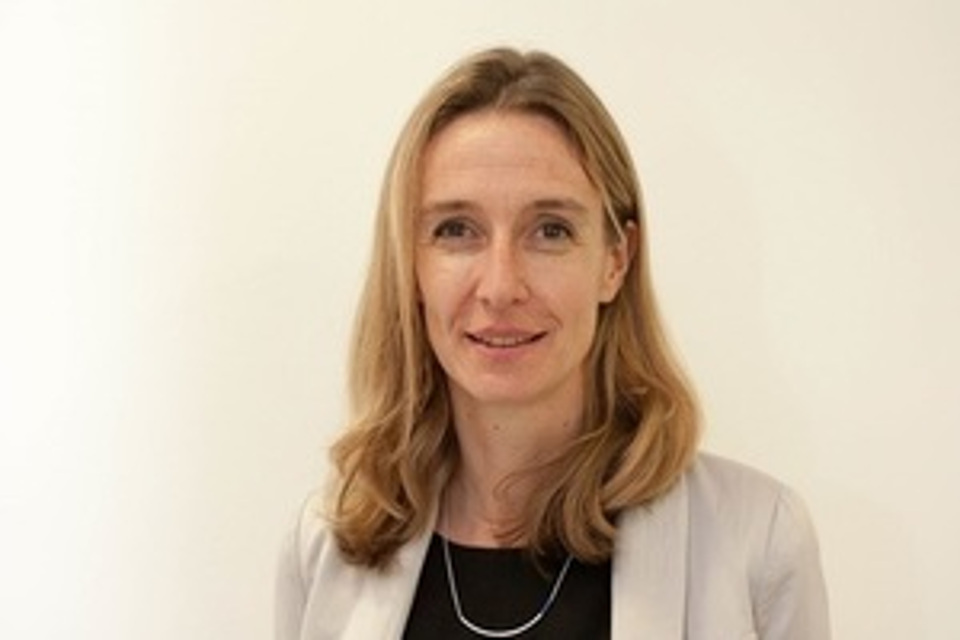
Juliet Chua, Director General - Diversity and Inclusion and Gender Champion
As DFID’s Diversity and Inclusion and Gender Champion, I am pleased to introduce this annual report setting out data and reporting on the profile and experience of our workforce.
This report presents data from 2017/18 and shows sustained progress against the targets we set ourselves. The report shows our work force is more diverse, but there is more for us to do to make DFID truly representative. It also shows an increase in the number of our staff who trust us enough to give us their diversity data. I am pleased to see this increase in reporting, as without good data, we cannot make progress in understanding the profile and experience of our workforce.
However, the report also shows there is much more to do to achieve our ambition of becoming the most inclusive employer across the Civil Service and to close the gender pay gap.
There is overwhelming evidence that diversity is not just the right thing to do, it makes an organisation better at making good decisions, at innovating and at understanding the full range of perspectives of those it serves.
The evidence is also clear, it is not enough to be diverse, that diversity needs to be supported by an inclusive culture that embraces and values different ways of thinking. Thriving at work means being able to bring our whole selves to work, it means challenging ourselves to know and embrace different ways of seeing the world and engaging with the varied experiences of those around us.
We set ourselves stretching objectives for our diversity and inclusion work in 2018/19 to continue to make progress and we will put diversity and inclusion at the heart of our organisation, delivered through our People Plan to be published shortly.
We will be changing the way we report our diversity and inclusion information We will share our diversity and inclusion information as part of the DFID Annual Report. This streamlines our processes while continuing to support our aims of transparency and accountability.
DFID actions against its objectives for 2017/18
DFID set the following objectives for diversity and inclusion in 2017/18:
- to carry out a thorough staff consultation to understand what diversity and inclusion means to them; what works to drive diversity and inclusion in organisations (in the UK and globally), and what should be our focus for diversity and inclusion going forward
- to systematically consider equality and diversity across all programmes
- to have a representative workforce at every level which feels valued and enabled to reach their full potential
- to have a culture where we all respect, celebrate and promote the value of diversity and inclusion
Progress against delivering these objectives has been positive.
During 2017/18, we undertook an organisation-wide consultation which lit a fire under the diversity and inclusion agenda and was a call to action for our staff. This led to the creation of our Fab 50, a group of 50 individuals in every part of the organisation who volunteered to work on transforming the diversity and inclusion of DFID.
The consultation also identified four core elements that should inform our approach:
- Respect: All staff regardless of grade, background or location, treating everyone with respect.
- Include: Promoting inclusive behaviours, using our data to drive workplace improvements.
- Support: Ensuring everyone is supported in the workplace to achieve their full potential.
- Engagement: How we will continue to engage with all staff.
Our Fab 50, our HR diversity and inclusion team and staff networks rightly promote the importance across the organisation of considering diversity and inclusion across all our programmes and in all that we do.
In addition, during 2017/18 we:
- set up pilots to explore whether SCS posts can be opened to flexible and part time working, and started to look at our SCS talent pipelines
- incorporated anonymised recruitment practices across the organisation
- piloted in year awards for performance (to recognise both what people do and how they deliver)
- saw improvements in reporting across all of our diversity data and started to capture data on socio- economic diversity and gender identity
- ensured that all leaders are focussed on championing diversity and inclusion by setting SCS diversity and inclusion objectives
This work has moved us on and given us evidence and data to change our approaches, but we need to keep the pace of change up.
DFID objectives for 2018/19
DFID has set challenging objectives for 2018/19, focusing on the priorities of race, disability and felt fairness:
- increasing staff declaration rates to 70% by 2021
- increasing the number of new SCS from BAME backgrounds to 13.2% and those that declare that they have a disability to 11.9% by 2021
- reducing the engagement gap in scores between disabled and non- disabled employees
- increasing the scores on felt fairness to 80%
This work will progress through the following actions:
- Carrying out a thorough staff consultation across the entire business to build a DFID-wide People Plan, which will have diversity and inclusion running throughout it and will help to support the cultural changes DFID wants to see, creating an environment that is inclusive for all.
- Development of the DFID senior champions network.
- Engaging with others across the Civil Service to understand the realities of transgenerational working and any implications this may have.
- Launching a new people performance system (Being my Best). This should help to break down barriers and encourage staff to be the best they can be.
- Reviewing the people policy in relation to bullying, harassment and discrimination processes to ensure all staff not only know how to raise concerns but feel safe to do so.
- Reviewing the workplace adjustment policy and introducing the workplace adjustment passport.
- Introducing gender neutral facilities in the UK estate, developing LGBT+ policies and consulting on the development of our transgender policy.
- Developing and starting to deliver conversations on Race across the entire organisation.
- Holding DFID to account by benchmarking against other Civil Service departments and private and public sector employers, by applying for accreditations with:
- Stonewall
- Working Families
- Business in the Community (Race)
- Employers Network for Equality and Inclusion
- Social Mobility Foundation
Progress and reporting against these objectives will be captured through reporting on the People Plan and our 2018/19 Annual Diversity and Inclusion Report, due for publication in the summer of 2019.
Context and Approach
There are 2 main forms of employment relationship at DFID; Home Civil Servants (HCS), who are appointed on UK terms and conditions of service, and Staff Appointed in Country (SAIC), who are appointed in their home country and work under local terms and conditions of service.
This report focuses on HCS employees. SAIC have the ability to record their ethnicity, disability status, flexible working patterns, caring responsibilities and sexual orientation, but we acknowledge that SAIC colleagues may be less willing to do so than HCS staff. This is due to sensitivities linked to the recording of some characteristics in some countries.
Recording rates amongst SAIC are therefore too low to enable us to report on the representation of different groups, however, we continue to actively encourage our SAIC staff to declare their diversity information.
The diversity of our SAIC Staff, who come from countries around the world, is something we celebrate.
We work in countries across Africa, Asia and the Middle East, many of which are fragile or at risk from fragile neighbors. We also have regional programmes in Africa, Asia and the Caribbean, and development relationships with 3 aid dependent Overseas Territories – St Helena, the Pitcairn Islands and Montserrat.
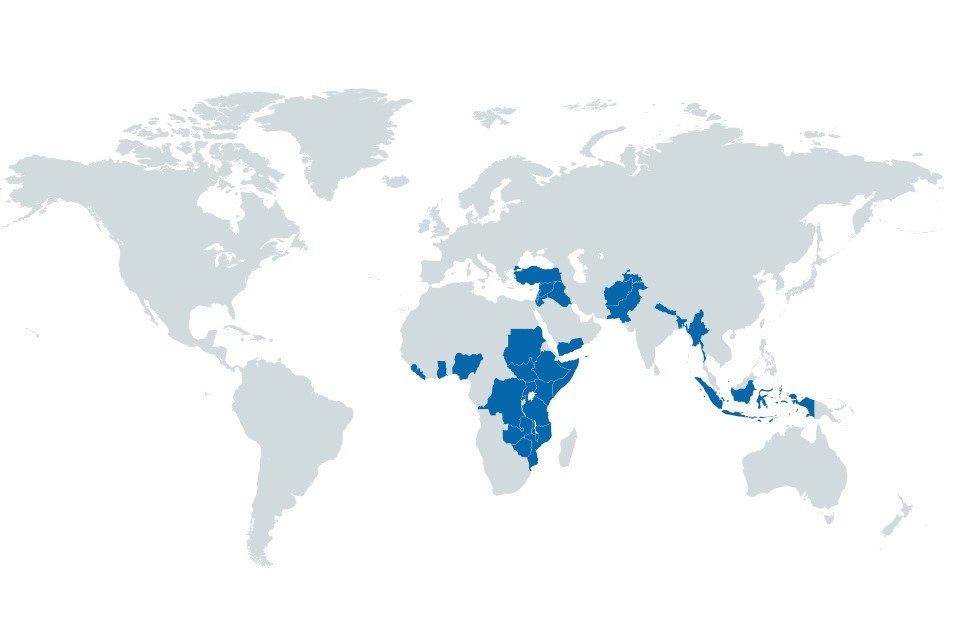
map
Where our staff are located.
Afghanistan, Bangladesh, Burma, Caribbean, China, Democratic Republic of Congo, Ethiopia, Ghana, India, Indonesia, Iraq, Jordan, Kenya, Lebanon, Liberia, Malawi, Mozambique, Nepal, Nigeria, Occupied Palestinian Territories, Pakistan, Rwanda, Sierra Leone, Somalia, South Africa, South Sudan, Sudan, Syria, Tanzania, Turkey, Uganda, Yemen, Zambia and Zimbabwe.
For most of this report we use data from our Human Resource System - HR Passport.
This report covers data from 1 April 2017 to 31 March 2018. Data represents a snapshot of DFID as at 31 March 2018 unless otherwise highlighted.
This report is part of DFID’s response to the Equality Act 2010. It provides data on the equality impact of DFIDs employment practices and activities. The Equality Act creates a public-sector equality duty to:
- consider how different people will be affected by our activities
- deliver services which, while efficient and effective, are accessible to all and meet diverse need
- have due regard for the need to eliminate unlawful discrimination, advance equality of opportunity, and foster good relations between people (both employees and others) who share a protected characteristic and those who do not
Protected characteristics covered by the equality duty are:
- Age
- Disability
- Gender reassignment
- Marriage and civil partnership
- Pregnancy and maternity
- Race (embracing ethnic or national origins, colour and nationality)
- Religion or belief
- Sex
- Sexual orientation.
Some of the data from this report is derived from central functions to the wider Civil Service such as Civil Service Learning and Civil Service Resourcing. This poses several challenges around categorisation for the purposes of analysis. For this reason, the categories employed may not be consistent throughout.
The Office of National Statistics also compiles its central representation data at the end of each financial year and publishes this in October. Data sets used in the report may not be completely comparable.
Note: DFID has not incurred the expense of collecting data specifically for this publication other than staff resource.
These are online publications and therefore no additional printing costs have been incurred.
Recording Diversity Data
Diversity data lets us identify the diversity of our workforce, based upon their personal information. This includes data on protected characteristics as covered by the Equality Act. All staff are asked to add information about their ethnicity, disability status, flexible working patterns, sexual orientation, religion or belief and caring responsibilities. Although DFID encourages staff to supply it, this is not mandatory and reporting rates vary by characteristic. The data is collected and held on HR Passport. The gender and age of all staff is automatically recorded on this system. To protect the privacy of staff who do not wish to record diversity data, it is possible for individuals to record a “Prefer not to say” response.
We have tracked our data over several years. This report builds a rich picture for future analysis and an intelligence led approach to management, engagement and development based on the personal characteristics of our staff.
The analysis of the diversity data we collect enables us to ensure we have policies that work, target development opportunities and where appropriate it also allows us to monitor any potential discrimination against staff with protected characteristics.
Declaration rates for our Home Civil Servant (HCS) staff are shown below.
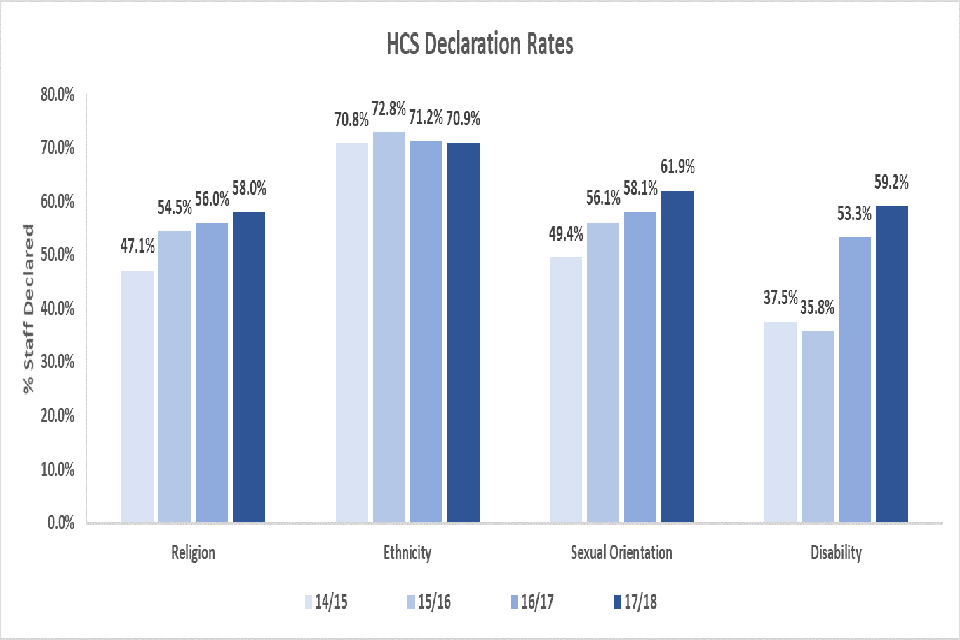
HCS Declaration Rates
*” Prefer not to say” is included in the Declared population.
Declaration rates increased in 2017/18 across most personal characteristics, though ethnicity decreased slightly by 0.3 percentage points (ppts). Sexual orientation and religion declaration rates have increased by 3.8ppts and 2.0ppts respectively. There has been a further 5.9ppts increase in the number of staff who have declared a disability, which takes the total increase over the last two years to 23.4ppts. This is a significant and welcome shift in this area and highlights the continued efforts of the organisation towards disability inclusion. We will continue to encourage our staff to declare their personal data during 2018/19 by communicating the valuable uses for which the data is employed.
Workforce Profile
DFID currently has staff in 54 countries across Africa, Asia, the Middle East and the UK. We employed 3,269 staff as at 31 March 2018, of whom 2,529 were HCS and 735 were Staff Appointed in Country (SAIC). Note that analysis included in this report focuses solely on our HCS staff.
In 2017/18, 55.4% of DFID’s workforce was female, a slight fall from 2016/17, though slightly higher than the Civil Service figure of 53.8%.
The percentage of HCS staff in DFID who have declared themselves as having a disability is at 13.4%, higher than the overall Civil Service figure (correct at 31/3/2018) of 10.0% and the latest available wider UK figure for working age adults for 2016/17 which is 19.0%.
In 2014, the Integrated Household Survey (IHS) stated that 1.6% of people identify as lesbian, gay, bisexual or transsexual. Using this data as a comparator, LGBT representation in DFID, which currently stands at 5.1%, is above average.
The percentage of Black, Asian and Minority Ethnic (BAME) staff in the Civil Service was 12.0% in March 2018. The level of BAME representation in DFID is slightly higher at 14.4%, based on those staff that have provided this data. UK Census data from 2011 showed that 13.4% of the UK working age population were BAME.
In the British Social Attitudes survey of 2016, 41.0% of the population described themselves as being Christian. The declaration rate for religion within DFID is 58.0%, and of the declared population, 40.6% identify as being Christian. Given the large number of religious groups it is still not possible to undertake detailed analysis based on religion without first achieving higher declaration rates.
Senior Civil Servants (SCS)
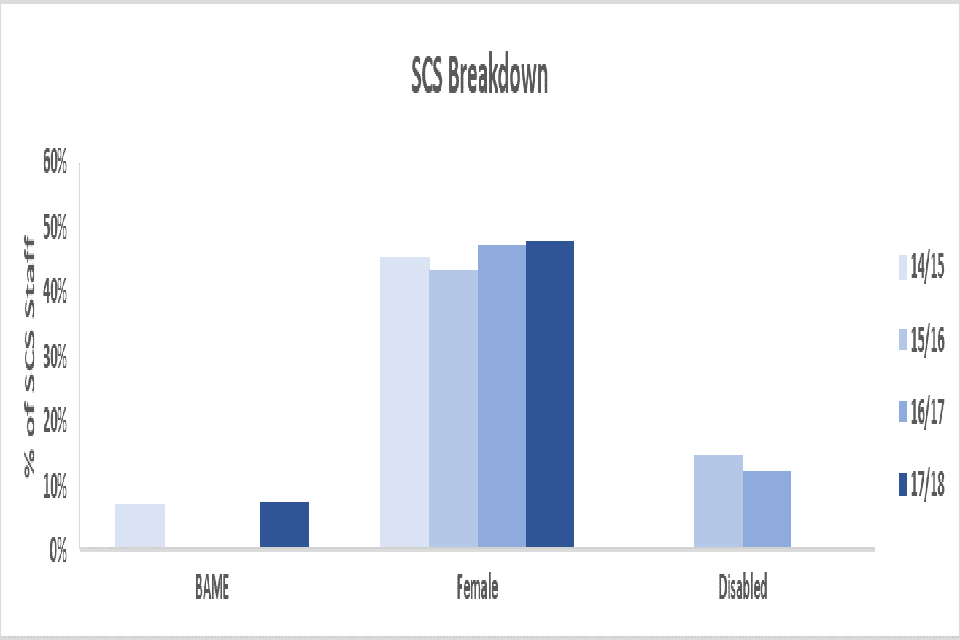
SCS Breakdown
Note: Disability information has been redacted in 14/15 & 17/18 for disclosure reasons, as well as SCS staff who declared as BAME in 15/16 & 16/17. Proportions exclude the “Not Declared” population.
In 2017/18, the proportion of women in the SCS increased slightly, continuing the rise from 2016/17. There has also been a slight increase in BAME SCS from 6.8% in 14/15 to 7.5% in 17/18. There has been a decrease in the proportion of SCS who have declared a disability from 14.7% in 15/16 to 12.3% in 16/17. Furthermore, this figure continues to be substantially below the wider UK figure of 19.0% of working age adults who declare a disability.
Over the next 12 months we will continue to focus on increasing the representativeness of our SCS population by ensuring that diversity objectives are integrated into divisional and corporate business plans and building commitment at SCS level to make diversity central to our global operating model.
Female Representation by Grade
DFID’s HCS workforce is 55.4% women. This is a decrease from 31 March 2017, when it was 56.3%, but is still slightly higher than the wider Civil Service figure of 53.8%.
Women’s representation has increased slightly over the last year for SCS and A1 grades but has decreased slightly or remained the same at all other grades. As at 31 March 2018, women make up 47.8% of the SCS, which is an increase of 0.7ppts since 31 March 2017.
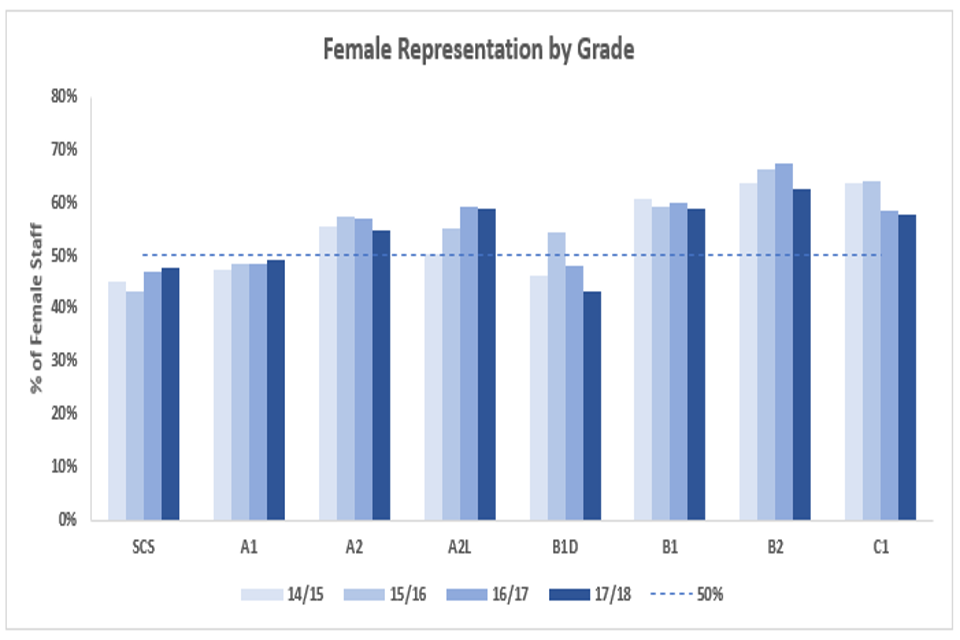
Female Representation by Grade
Additional information on DFID grade composition and our Gender Pay Gap can be found in our Gender Pay Gap Report.
Maternity, Paternity and Shared Parental Leave
| Type of leave | 2016/2017 | 2017/2018 |
|---|---|---|
| Number of staff who took maternity leave | 104 | 105 |
| Number of staff who took paternity leave | 33 | 28 |
| Number of staff who took shared paternity leave | 9 | 17 |
The total number of staff who took paternity leave decreased slightly in 2017/18, but 17 HCS staff took shared parental leave during 2017/18, which was almost double the number from 2016/17. This is very positive, and we will continue to raise awareness on the benefits of shared parental leave as part of our flexible working offer available to DFID staff.
Ethnicity Profile
2017/18 saw a small decrease in the percentage of HCS staff who declared they were from a BAME (Black, Asian or minority ethnic) background from 14.5% in 2016/17 to 14.4%. The highest declaration rates for BAME staff are at grade B2.
We are looking at how we can improve our communications and advertising to better attract and increase the number of applications from BAME candidates across all grades.
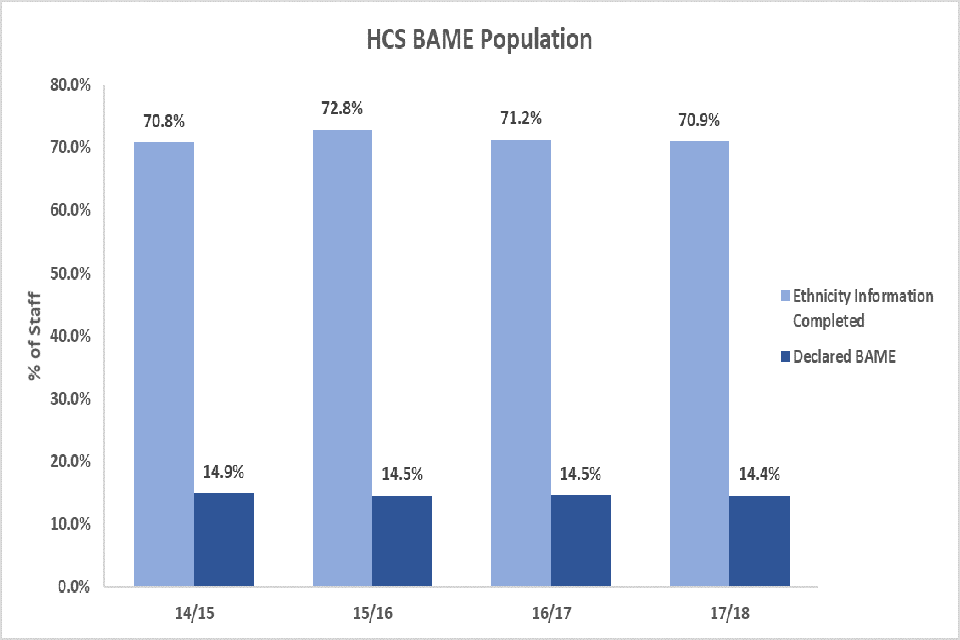
HCS BLAME Population
The Chart above excludes the “Not Declared” population.
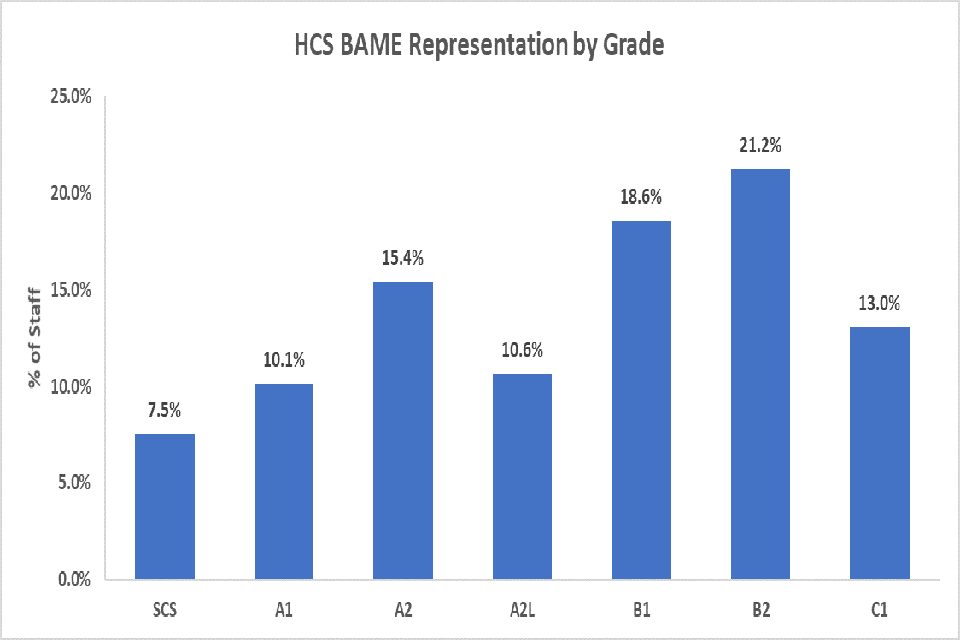
HCS BLAME Representation by Grade
The Chart above excludes the “Not Declared” population. Grade B1D has been removed for disclosure reasons.
Religion
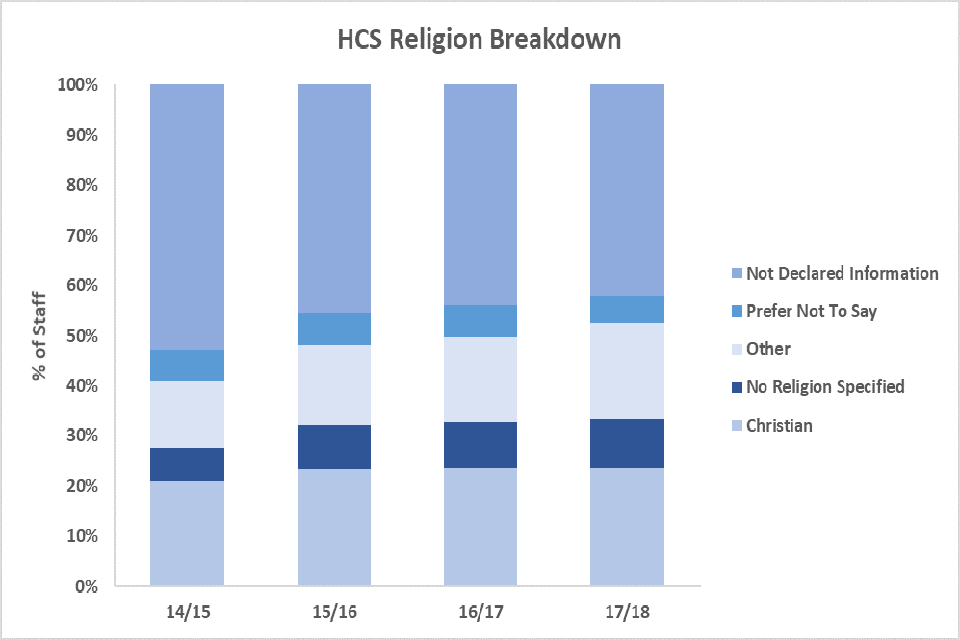
HCS Religion Breakdown
In 2017/18, 58.0% of our HCS staff have declared a religion. Of those, 23% identified themselves as being Christian and 26.5% of our HCS staff did not declare information.
Given the large number of religious groups it is not possible to undertake detailed analysis based on religion without first driving up declaration rates.
Disability
Across the Civil Service, a total of 10.0% of staff have declared a disability. In DFID, 13.4% of HCS have declared a disability, slightly above the Civil Service figure. Despite an increase in the last year, declaration rates remain low compared to rates or other protected characteristics. The highest declaration rates for staff with disabilities are at grade B2.
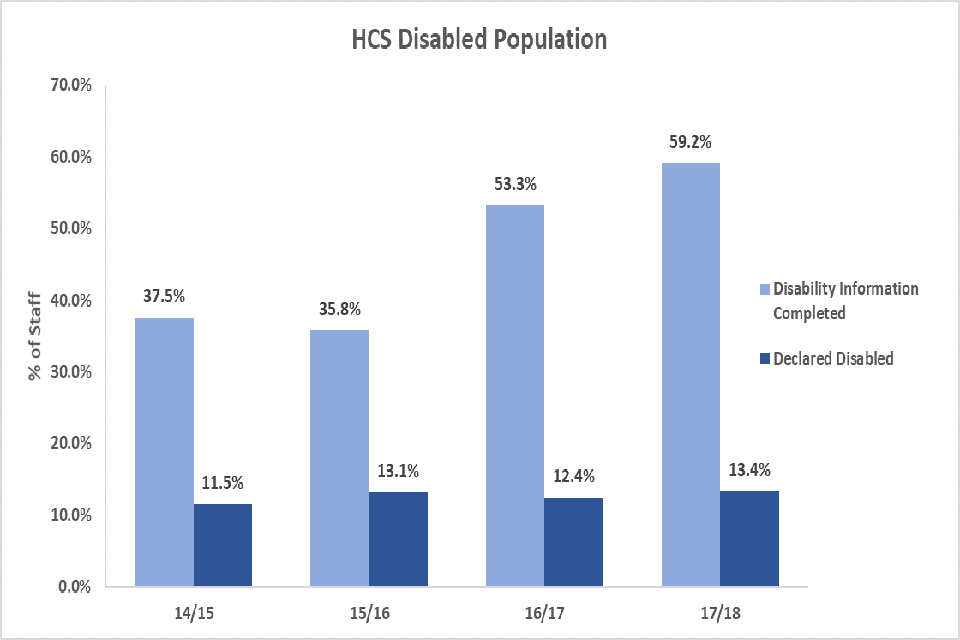
HCS Disabled Population
The Chart above excludes the “Not Declared” population.
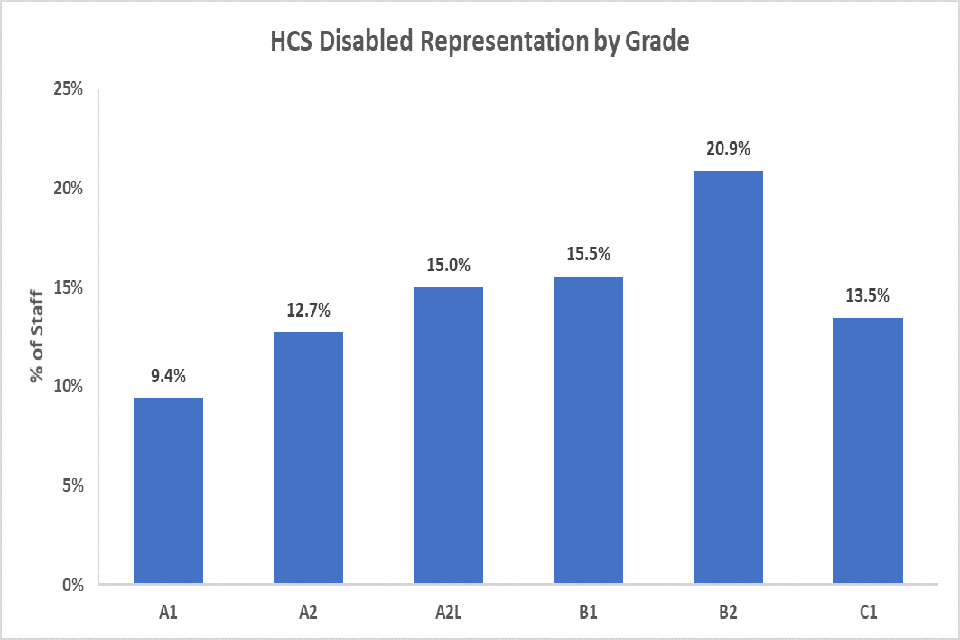
HCS Disabled Representation by Grade
The Chart above excludes the “Not Declared” population. Grades SCS & B1D have been removed for disclosure reasons.
Age
The number of staff under the age of 25 has continued to increase as a percentage of our workforce, but they are still a significantly under-represented element.
Age profile of HCS staff
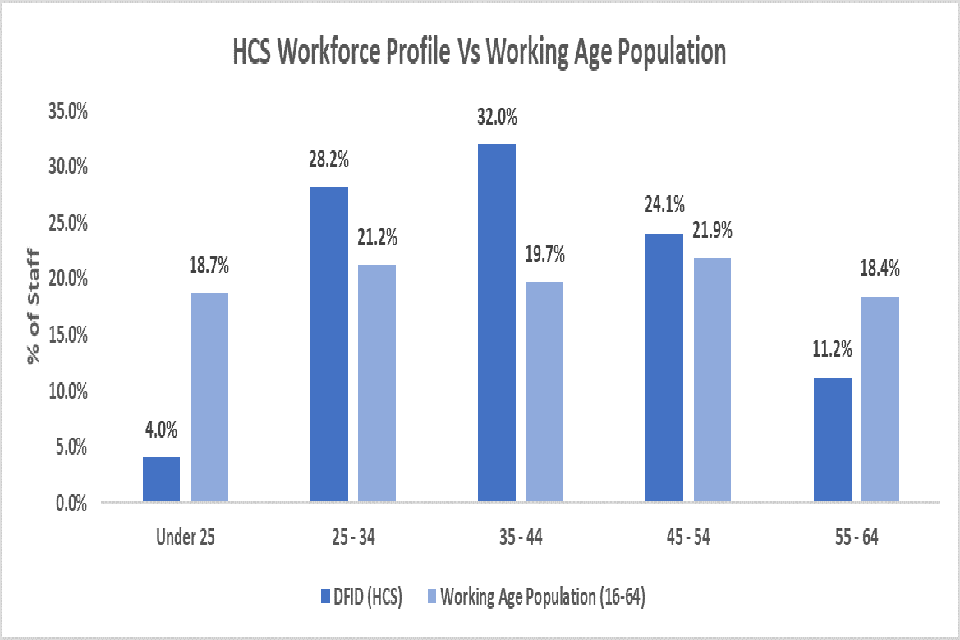
HCS Workforce Profile Vs Working Age Population
Working age population proportions calculated from 2017 Population estimates and deaths by single year of age for the UK, produced by the Office for National Statistics.
LGBT+
At 31 March 2018, 5.1% of DFID HCS staff had declared themselves as lesbian, gay, bisexual or transgender, an increase of 0.7ppts from 2016/17. The highest declaration rates for LGBT+ staff are at grade A2L.
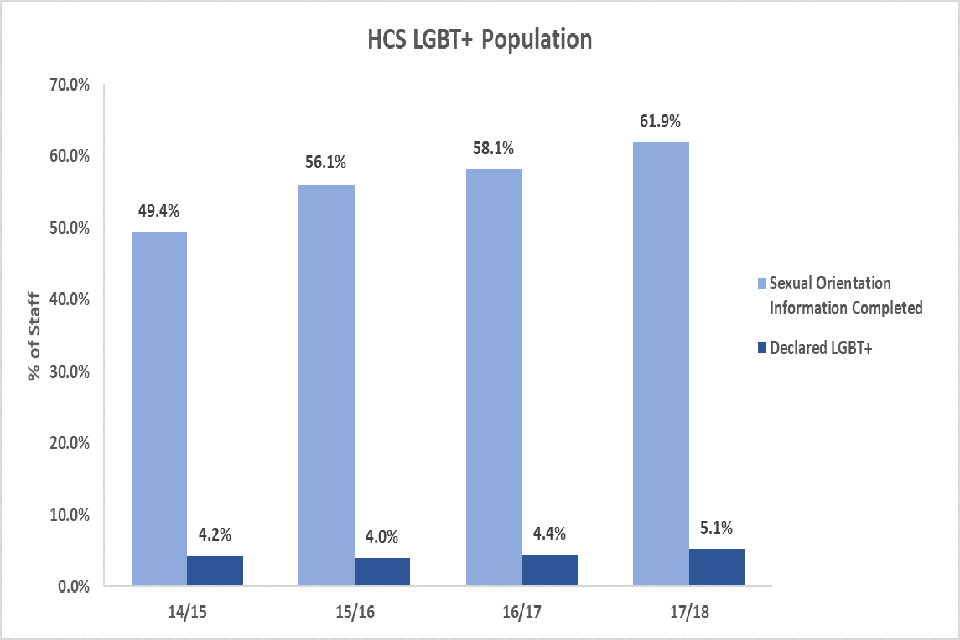
HCS LGBT+ Population
The Chart above excludes the “Not Declared” population.
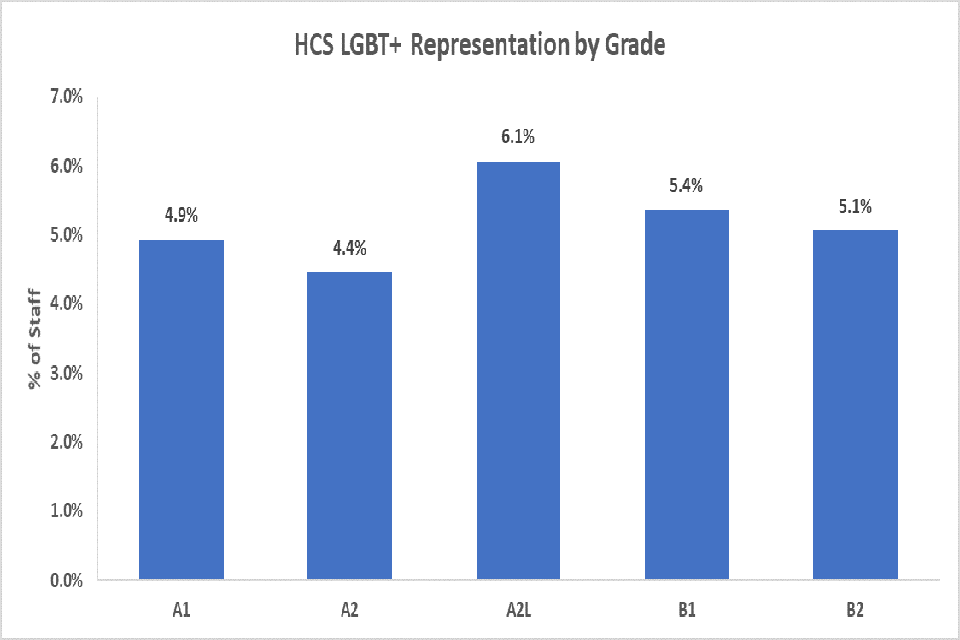
HCS LGBT+ Representation by Grade
The chart above excludes the “Not Declared” population. Grades SCS, B1D & C1 have been removed for disclosure reasons.
HCS Staff Recruitment and Talent Schemes
Recruitment and Retention
DFID recruits talented people from all backgrounds. Our aim is to ensure that we are the best we can be and to represent the country we serve. We follow the Civil Service Recruitment Principles of fair and open competition. For the recruitment of SAIC staff, in our overseas locations, we aim to appoint the best candidate, subject to local restrictions and employment law, and recruitment campaigns are open to all. Following a successful trial, we fully introduced anonymised recruitment for all posts in 2017/18.
During 2017/18 we recruited 323 new permanent HCS staff.
- 50.8% of our new starters were women
- more new starters were aged 25-34 than any other age banding
- 31.9% of our new starters were at Grade A2
During 2017/18 174 permanent HCS staff left DFID.
- 54.0% of our leavers were women
- staff aged 35-44 were more likely to leave DFID than any other age banding
- we saw more staff at Grade A2 leave DFID
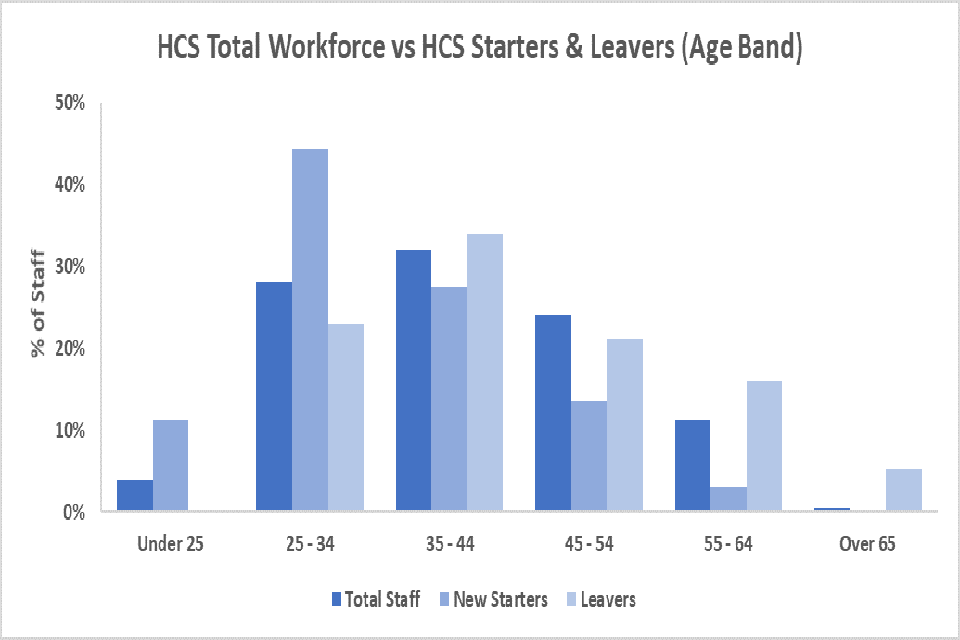
HCS Total Workforce Vs HCS Starters and Leavers (Age Band)
Removed New Starters “Over 65” and Leavers “Under 25” for disclosure reasons.
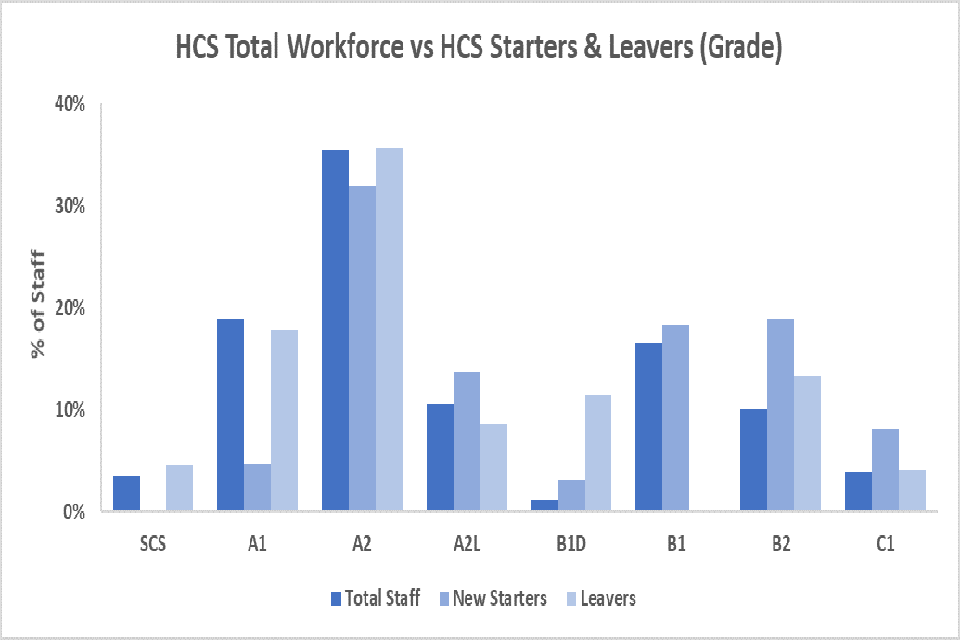
HCS Total Workforce Vs HCS Starters and Leavers (Grade)
Removed Grade C2 and Other, along with SCS New Starters and B1 Leavers for disclosure reasons.
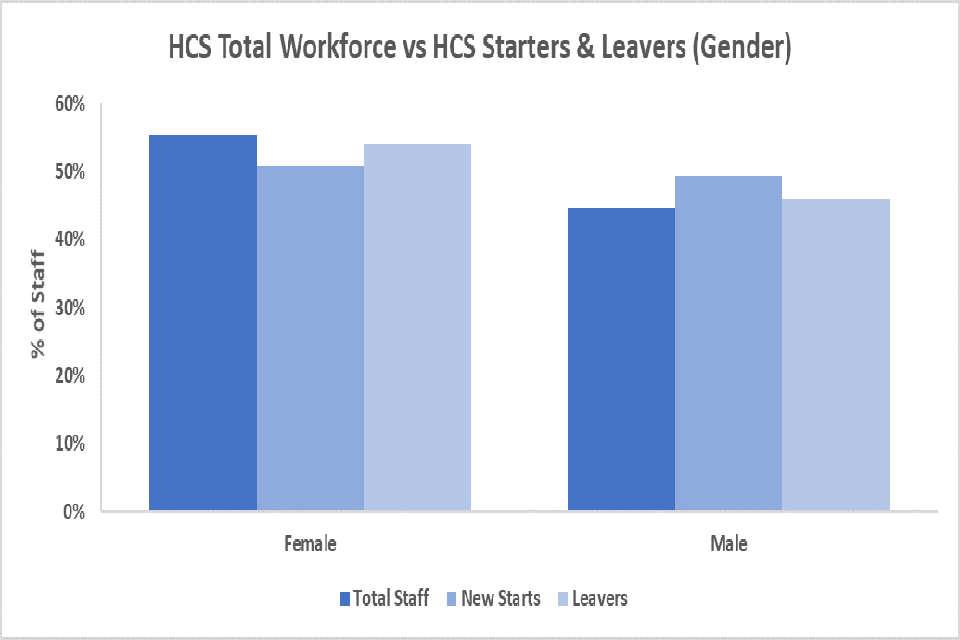
HCS Total Workforce Vs HCS Starters and Leavers (Gender)
Positive Action
We continued to target outreach at under-represented groups including ethnic minorities and people with disabilities and/or health conditions, maintaining a robust global talent management and succession planning strategy and building staff capacity at two levels:
- providing the appropriate tools, courses and workshops to equip staff at all levels to understand and advance diversity
- mentoring and coaching of targeted staff, creating innovative communications materials across multiple platforms to build awareness about diversity and setting measurable targets and objectives that are achievable by divisions and country offices
Talent Schemes
We want to offer staff of all grades and backgrounds the opportunity to progress and fulfil their potential. This will help DFID to have a good pipeline of diverse talent.
In line with our aspiration to increase the diversity of our senior managers, we have continued to work to remove barriers to career progression for all talented staff under-represented in our senior grades. This includes continuing to encourage staff to join Civil Service talent programmes such as:
- Senior Leaders Scheme
- Future Leaders Scheme
- Positive Action Pathway
The vision for our workforce remains the same, that they are more diverse with the right skills, and that they can develop to their full potential.
We have also continued working towards an increase in both the diversity of our ‘talent pipeline’ and of our senior managers. We are pleased that we are seeing more applications for talent schemes and for senior roles from staff who have disabilities, BAME staff, LGBT+ staff and women.
Graduates
We have increased the diversity of candidates accepted onto our two-year entry talent scheme. Participants will work on both policy and programme management, whilst they are completing a leadership and management apprenticeship. At the end of the two years there is an opportunity for a one-year overseas placement tailored to the individual’s mobility, aspirations and performance.
On completion of the programme, individuals will be assessed and matched to an appropriate role aligned to workforce plans.
In 2017/18 we recruited a total number of 25, of which:
- 8% were BAME
- 68% were female
To attract the widest pool of applicants we targeted advertising, attending specific skills events, using current graduates and apprentices as ambassadors and their profiles to encourage further applications.
We are reviewing our attraction, recruitment and selection processes so that we continue to improve.
Internships
DFID offer paid internships through targeted recruitment campaigns. We continued to target individuals from backgrounds currently under-represented in our workforce, or those who bring skills we require to achieve our objectives.
We will work with Leonard Cheshire on internships for those with a disability in 2018/19.
All work experience placements are awarded strictly on merit, after a competitive application process. Schemes in 2017/18 included the Summer Diversity Internship Programme, and Graduate Internship Programme– both programmes are advertised on Civil Service Jobs website.
The programmes give UK citizens from diverse backgrounds (either BAME, disabled or those from a disadvantaged socio-economic background) the opportunity to see what a career in the Civil Service is like.
Performance and Talent Management
Effective performance and talent management is crucial to develop and get the best out of staff to ensure that we deliver our goals. The performance management cycle is central to ensuring that DFID continues to be a high performing organisation.
The performance and talent management cycle has three key phases:
- set - setting performance expectations and objectives
- monitor - regular performance discussions, including reviewing underperformance
- assess - mid/end of year reviews and talent management
For the performance year 2017/18 DFID had a 3-box rating system. These ratings were:
| Box 1 | Consistently excels in delivering a challenging set of high stretch objectives; has met or exceeded these objectives in terms of delivery and by strongly demonstrating and role-modelling the competencies; behaviours and values expected from someone in their own and at a higher grade/pay band. |
|---|---|
| Box 2 | Consistently delivers objectives and demonstrates behaviours, competencies and values set for the role/grade |
| Box 3 | Underperforming. Objectives are delivered sporadically or not at all and behaviours, competencies and values set for the role/grade are not being demonstrated. Objectives may all be delivered, but at a standard below what would be expected for the role/grade, and behind timescale. |
As per Cabinet Office guidance, we had a guided distribution for the number of staff within each rating. These were:
Box 1 – 25% of staff, Box 2 – 65% of staff and Box 3 – 10% of staff.
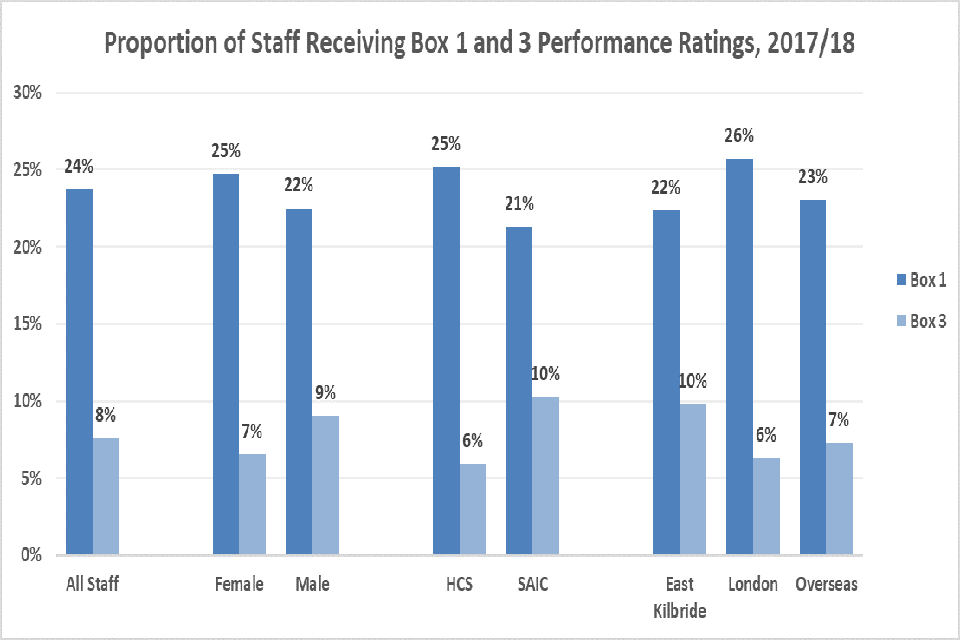
Proportion of Staff Receiving Box 1 and Box 3 Performance Ratings, 2017/18
Developing HCS Performance and Talent Management Going Forward
During 2017/18 we proposed, consulted on and agreed a new Performance Management system “Being My Best”, which launched in April 2018. The system aims to secure our success and results as an organization by helping everyone to maximize their contribution and realize their potential. It focuses on the development of future performance, rather than assessing past performance and is based on what we know (and evidence tells us) drives performance and talent improvement:
- open, honest, and respectful relationships between line managers and employee
- flexible objective setting underpinned by clear expectations (‘what’ and ‘how’)
- regular conversations, signals and feedback about how staff are doing
- regular, timely recognition or reward
Performance is assessed on a quarterly basis against the delivery and behavioral expectations set out in objectives.
We use a simple model of expectations met or not met. Both delivery and behavioral expectations must be achieved to be assessed as meeting expectations. The purpose of awards is to recognize individuals and teams who have delivered exceptional performance, and made a significant, positive contribution, while demonstrating the values and behaviors we are looking to promote.
We will regularly monitor and review the success of the new system, including the impact (positively or otherwise) across demographics.
Civil Service People Survey - DFID results
The Civil Service conducts a People Survey each year in October to measure staff engagement. In 2017, 85% of DFID staff completed the survey and our overall engagement score was 71%.
DFID has one of the highest staff engagement figures across the Civil Service and has for the past three years seen engagement scores of over 70%.
Over the last 4 years we have seen consistent positive increases in engagement across part-time staff and those declaring a disability, taking engagement levels for these staff up to about the DFID average.
In addition, we saw slight increases for the following groups which is very encouraging:
- LGBT+
- those living outside the UK
- staff aged between 20-24, 30-34 and over 6
Engagement has dropped slightly in 2017 for our staff aged 40-60, and there has been a slight increase for staff in Scotland.
In addition to engagement, staff are also asked if they have been subject to bullying, harassment and discrimination as part of the People Survey.
Bullying and Harassment
| Bullied or Harassed | 2014 | 2015 | 2016 | 2017 |
|---|---|---|---|---|
| Yes | 10% | 9% | 10% | 11% |
| No | 81% | 85% | 83% | 82% |
| Prefer not to say | 9% | 7% | 7% | 7% |
These figures represent those staff who completed the People Survey Questionnaire (85% of our staff). They show that 11% of our staff reported that they personally experienced bullying or harassment. Of those who reported personally experiencing bullying and harassment at work in the past 12 months, the top 3 grounds were:
- gender
- age
- race
Of the 11% of staff who selected ‘YES’ to the question of whether they had experienced this:
- 31% reported it
- 55% didn’t report it
- 13% preferred not to say whether they had or not
Overall, only 20% of those experiencing bullying and harassment felt the issue has been resolved.
In line with many Departments in the Civil Service, this has been a consistent issue for DFID in the last 4 years. Our work on diversity and inclusion aims to ensure a positive working environment for all our staff.
We are interested to learn the findings of the Sue Owen Report on bullying, harassment and discrimination across the Civil service, and we will embed the report’s recommendations.
In addition, we will adopt the cross-government CS Employee Model Policy and continue to focus on promoting inclusive behaviours to prevent the issue as well as tackling directly.
Discrimination
About 1 in 7 (14%) of our staff reported that they personally experienced discrimination at work in 2017; a similar level to 2016.
| Felt discriminated | 2014 | 2015 | 2016 | 2017 |
|---|---|---|---|---|
| Yes | 12% | 11% | 13% | 14% |
| No | 78% | 80% | 78% | 77% |
| Prefer not to say | 10% | 9% | 9% | 9% |
Inclusion and Fair Treatment
Of those who completed the survey, 82% feel they have been treated fairly at work, up slightly on the previous 2 years, though this increase is not statistically significant.
| I am treated fairly at work | 2014 | 2015 | 2016 | 2017 |
|---|---|---|---|---|
| Agree/Strongly agree | 80% | 81% | 80% | 82% |
| Neutral | 10% | 11% | 11% | 9% |
| Disagree/Strongly disagree | 10% | 8% | 9% | 9% |
| I feel valued for the work I do | 2014 | 2015 | 2016 | 2017 |
|---|---|---|---|---|
| Agree/Strongly agree | 72% | 71% | 72% | 73% |
| Neutral | 15% | 17% | 15% | 15% |
| Disagree/Strongly disagree | 13% | 12% | 13% | 12% |
Misconduct and Grievance
For the purposes of this report, we cannot provide information on protected characteristics data beyond gender, without risking the anonymity of colleagues.
Overall use of the disciplinary procedure is at its lowest level since reporting began. Application of the procedure has been more even this year although the low levels of formal disciplinary action should be noted when interpreting these numbers.
There were 15 recorded discipline cases in 2017/18 - 9 of the individuals disciplined were men.
Eleven grievance cases were raised, 9 of these by women. Three cases were upheld, all of these being in favour of women. The Department for International Development: leading the UK government’s fight against world poverty.
Department for International Development
22 Whitehall
London SW1A 2EG UK
and at:
Abercrombie House
Eaglesham Road
East Kilbride Glasgow G75 8EA
UK Tel: +44 (0)20 7023 0000 Fax: +44 (0)20 7023 0016
Website: www.dfid.gov.uk
Facebook: www.facebook.com/ukdfid
Twitter: @DFID_UK
Email: enquiry@dfid.gov.uk
Public enquiry point: 0845 3004100 or +44 1355 84 3132 (if you are calling from abroad)
© Crown copyright 2018 Copyright in the typographical arrangement and design rests with the Crown. This publication (excluding the logo) may be reproduced free of charge in any format or medium, provided that it is reproduced accurately and not used in a misleading context.
The material must be acknowledged as Crown copyright with the title and source of the publication specified. Published by the Department for International Development.
